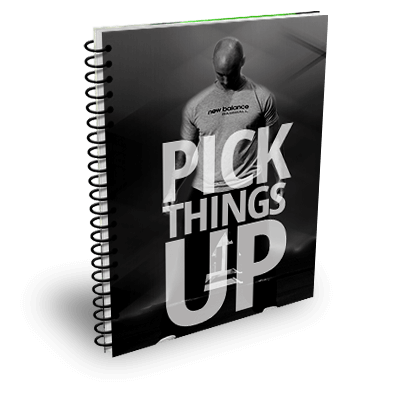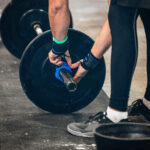7 Ways to Lose Weight Without Counting Calories, Tracking Points, or Going Crazy
I made an executive decision yesterday that with Christmas Eve and Christmas right around the corner (NINTENDO 64!!!!!!!!!!!!!!) I’d treat myself to a little blog-cation.
Now, don’t get me wrong: I love writing this blog. But sometimes I just need to take a break, smell the fudge roses, take a dee breath, and chillax.
So with that said, you won’t be hearing back from me until the day after Christmas (Wednesday). Thankfully my good friend, Sirena Bernal, reached out and wrote this spectacular guest post for the site.
Sirena and I have been chummy for a little over a year now, and we actually live in the same neighborhood, sometimes bumping into one another at the local Panera on a Friday night when we’re both trying to catch up on some writing or reading.
Yeah, we’re cool like that.
Anyways enjoy! And Happy (and safe) Holidays to everyone!
Before we even knew what a calorie was, we survived by relying on instinct, on feeling, and on the wisdom that was passed down to us from our elders – from people like grandma. Meaning, before we started to read labels, we just ate food.
We didn’t rely on measuring, tracking points, or distributing macronutrients, and we certainly didn’t rely on counting calories.
In fact, the idea of the calorie that we are now familiar with, was originally a term derived to describe the combustion energy produced from a steam engine (1), not the metabolism of a homosapien.
Steam engine and human being? Not exactly in the same genus, and thus, in my opinion, one reason why it’s a flawed model to follow in regards to nutrition – for the long term health and well-being. Again, IMHO.
I am not saying that creating a calorie-deficit (expending more energy than you consume) will not lead to weight loss, as it most certainly will. However, I am saying it is not the only way to approach weight loss. And as you will see in a minute, I’m going to share with you 7 others.
Why Calories Don’t Work for Humans
As beautiful and unique individuals as we are, so are our metabolisms and our body’s ability to digest, breakdown and utilize foods.
No two people are the same, and thus no two metabolisms are the same. However, most diet and nutrition literature will lead you to believe that a standard formula can be used to accurately gauge the amount of food we need to consume.
It’s easy to find an online calculator in which you input your weight, height, and activity level and in return get an arbitrary number that doesn’t take some of the most influential factors that affect our metabolism into play.
Factors such as the weather, temperature, stress levels, amount of sleep, hormonal fluctuations, prescription medications, supplements, thought-patterns and travel patterns can all affect our body’s ability to metabolize food, and thus affect the amount of “calories” we need to function at our best.
Thus, focusing on tracking calories without considering the dynamic flux of our metabolism can further create a hypometabolic state (low metabolism), which the majority of our culture suffers with.
You Are Not a Cyborg
Before you whip out the calculator and start crunching numbers, understand that it’s never a clear cut answer.
And for some, that may be frustrating to hear because we all just want to know exactly how much, at what time, and when.
But here’s the thing: life is not exact.
And neither is your schedule, or the weather, or your biology…unless of course you’re a cyborg, which I’m assuming you are not. (But if you are, I need to meet you).
If we allow it, our body will tell us exactly how much food we need, what we need, and when we need it, if we only listen.
Developing this skill does take time and patience but once we learn to listen to our body, we will begin to find the process of losing weight, much much easier than trying to calculate how many calories 30 grams of carbs, 20 grams of protein and 5 grams of fat equal.
There are much easier ways to approach weight loss that does not require counting calories, and here are 7 of them:
1. Eat with smaller plates, bowls and spoons.
Research has shown that the bigger your plate or bowl, the more you end up eating – choose a smaller bowl and you end up eating less. Participants in a study published in the American Journal of Preventive Medicine, served themselves 31 percent more ice cream when they were given a 34-ounce bowl instead of a 17-ounce bowl.
2. When filling your plate fill about 75% of what you would normally fill.
Our eyes are generally bigger than our stomachs, so prevent over eating before you actually eat. The next time you plate your food, take a “normal” scoop, and then put 25% of it back (before you actually put it on your plate, because putting food back once it’s on your plate is just bad manners.)
After you fill your plate, follow the rest of the steps below, and then decide if you’re still hungry before going back for seconds.
3. When eating, stop when you are 2/3 full.
You know that point when you’re so full that your belly is pushing against your belt buckle? Yeah, don’t get to that point.
Before you feel the need to unbuckle your belt, stop yourself when you feel like your 2/3 of the way there, and take a few moments to ask yourself if you are really hungry or if you are just eating to eat.
4. Always eat a protein, a carb and a fat source together.
By combining a protein, fat and carb you optimize your hormonal response to your meal thus keeping your blood sugar levels balanced, which will keep you satiated longer, thus preventing you from snacking after a meal.
5. Eat in peace and not on the run and without the distraction of computers, t.v. or reading which will help slow you down and level up your digestive powers.
Eating on the run is as effective for your digestion as being in 2nd gear on the highway is for your car. Not very.
When your brain and/or body is stimulated while you are eating, like if you are watching t.v. or eating in a rush, you end up activate your sympathetic nervous system which stimulates stress hormones.
However, being relaxed and calm while you eat, activates your parasympathetic nervous system, which, is responsible for digestion and breaking down your food to be absorbed. When you break down food better, you absorb your meal better, and thus get fuller faster.
6. Chew your food thoroughly before swallowing and take your time with eating, putting your fork down between bites.
It doesn’t matter if you count your chews, count seconds, or meditate when you eat. What does matter is that you take your time and actually chew.
Here’s a little challenge: Next time you eat, try to chew long enough until your food is liquefied. $5 if you can eat a whole meal this way.
7. SLOW down (or take your meal on a date.)
This is what I mean by this: when you are on a date, let’s say, a first date, or with someone you’re really into, you’re not gonna be checking your phone, or other people in the area. You’re in the moment, you don’t want to rush.
Now, with that same fervor that you would show your date, show that same attention to your food. Remove distractions, take your time, appreciate the food, and take your time with the food.
The same attention you’d give to a date, give to your food. This will not only allow you to slow down and thus eat less, but you’ll actually enjoy what you’re eating, appreciate your food and the eating process.
Final Pearls of Wisdom
The idea of losing weight without counting calories is clearly not as tangible or concrete, and may take some time to adjust to. However, if you can begin to practice these tips, it’s one of the most liberating and stress-free ways to approach weight loss.
The idea behind this process is to get you to a point where you can begin to listen to your body and just know, like Grandma did, when enough was enough.
This process does take more time and commitment on your part, but is very rewarding when you begin to tune in and know exactly what you need, when you need it, and how much you need.
References:
- http://jn.nutrition.org/content/136/12/2957.full
- http://www.sciencedaily.com/releases/2006/08/060803082602.htm
Author’s Bio
Sirena is a nutrition and lifestyle expert in Boston, MA, and she holds her B.S. in Kinesiology from UNH. She has been training clients in the fitness industry for over 8 years and runs the Lean Body Challenge, a 28-day nutrition program designed to help women lose weight without dieting and over-exercising.
Her clients consistently lose 8-15 lbs. during the challenge and maintain the weight loss without the need to count calories or rely on cardio. Her work has been featured in PTonTheNET.com, Greatist.com, and she is a regular blogger for BostonMagazine.com



Comments for This Entry
RS
Sirena, I great read read and one that I (truly) wish more folks took to heart. RSDecember 25, 2012 at 5:46 pm |
jontyw
one extreme internet blogger (called Jamie) says call of duty always standing up with a 50lb weighted vest onDecember 31, 2012 at 4:58 am |
Fat Loss Friday! | South Coast Performance
[...] 7 Ways to Lose Weight Without Counting Calories, Tracking Points, or Going Crazy – Sirena Bernal (Guest post on www.tonygentilcore.com). [...]January 4, 2013 at 3:46 am |
oliviajoness
Thank you for this article! Not all calories are counted equal... that is so true and yet such an easily understated fact.March 24, 2014 at 7:53 pm |
The Ultimate Guide on How To Lose Fat
[…] 7 Ways to Lose Weight Without Counting Calories, Tracking Points, or Going Crazy | Tony Gentilcore […]December 9, 2015 at 5:16 am |